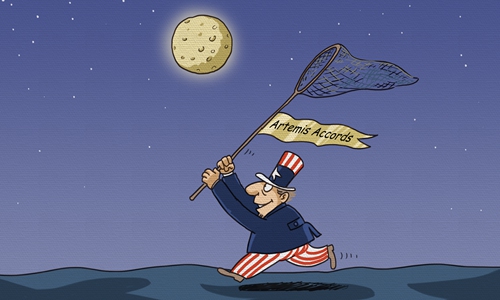US shows ambition for space hegemony amid grim COVID-19 situation
By Wang Yiwei Source:Global Times Published: 2020/5/12 20:58:09

Illustration: Liu Rui/GT
The White House is drafting a new international agreement, Artemis Accords, as a blueprint for mining on the moon with an aim of protecting "American bases from rival operations."
The program can be seen as the latest US effort to boost its allies' confidence in the US leadership, especially before the upcoming US presidential elections, and to reconsolidate loose ties that were damaged due to US response to the pandemic, such as intercepting medical supplies that its allies secured from other countries, mainly China.
The pandemic has unveiled Washington's selfishness and apathy, raising tensions with its allies. In turn, this has increased US' fears that its partners may side with China in the next round of competition between Beijing and Washington.
Hit hard by the novel coronavirus outbreak, US' traditional military bases and crew members on its four aircraft carriers have been infected, leaving its navy and army forces greatly weakened. A threatened US, therefore, has begun to shift the focus of its hegemonic ambitions to outer space - where its dominance is strong, just as it is in cyberspace.
Notably, the release of the Artemis Accords came on the heels of the successful maiden mission of China's latest state-of-the-art carrier rocket, the Long March-5B, launched on May 5. The mission signals that China is a step closer to constructing its own space station.
The timing of this coincidence has created widespread speculation that this is a tit-for-tat move against China. Many argue the US is trying to flex its muscles in outer space to attract attention of other countries, and steal China's thunder.
The Trump administration has long regarded the moon as a crucial strategic resource in outer space and has marshaled extensive investment in scientific research on it.
With the Artemis Accords, the US reportedly proposed the idea of "safety zones" that would "surround future moon bases to prevent damage or interference from rival countries or companies operating in close proximity," Reuters reported on May 6. But the proposal sounds like the US wants to occupy space territory with a "first come, first served" course of action.
The hegemonic logic of the US has always prompted the country's thirst for being exempt from the constraints of international treaties.
High oceans, outer space, the Antarctic, as well as the atmosphere are global commons, meaning they are international, supranational, and global resource domains, which are supposed to be common human heritage.
Yet the US fantasizes to make the moon and space its own by getting there first. Planting a US flag on the moon during the first moon landing by the Apollo program in 1969 can be argued as a proof. Such a monopolistic approach is frequently practiced today. For instance, reports show that the Trump administration allegedly offered a German medical company "large sums of money" in March for exclusive rights to a possible COVID-19 vaccine.
In response to the egoistic US, China stresses the power of international justice and the safeguarding of regional peace through the development of high technology. If the US is allowed unfettered expansion of its hegemony and monopoly in space, the future of the entire human race will become absolutely dark.
Space has become a new military frontier for a growing number of countries. The US-proposed initiative now marks NASA's growing role as a diplomatic platform to deliver Trump's foreign policy.
NASA, like the Federal Reserve System, bills itself as an independent agency, but it is increasingly tied to the US government as a blunt political tool for the country to lead the world.
Trump showed his naked ambitions for moon explorations amid the ugliest moments of the COVID-19 crisis in the US. This signals that the US will never prioritize people's lives and health during major crises.
Living in such a liberal country, Americans have to take care of their own existence, because their government is too busy seeking space hegemony in outer space.
The author is professor at the School of International Relations at Renmin University of China. opinion@globaltimes.com.cn
Posted in: VIEWPOINT